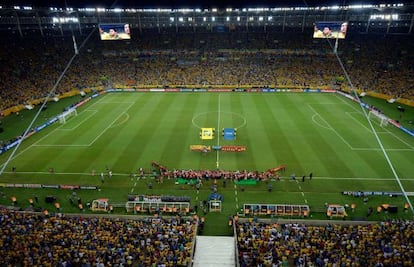“We want Maracanã returned to us”
Protestors at the Brazil-Spain match complain that soccer has become a sport for the privileged


"Give us back the Maracanã" read one banner held by protesters who clashed with police during the Brazil-Spain soccer match on Sunday.
The stadium in Rio may be beautiful, but it no longer belongs to the people -- o povo -- say the protesters. The refurbishing cost $600 million, double the amount estimated expected, and a private consortium was awarded a management contract for the next 35 years.
The old and mythical Maracanã, without a doubt, once belonged to the cariocas – it had theaters, and an area called geral where the poorer resident enjoyed cheaper prices.
That is now all gone. Ancelmo Gois recently wrote in his widely-read column in O Globo: "Yesterday, at the Maracanã, as is happening at the other stadiums hosting the games of [Confederations] Cup, it is rare to find a black person and probably a poor man among the spectators." But there were "ladies who went to the stadium wearing high-heeled shoes and carrying bags by the American designer, Michael Kors.”
Criticism about how soccer has become an elitist sport is not only coming from the street but is also being heard in the presidential palace in Brasilia. President Dilma Rousseff told her ministers: “I have not seen one black person at the stadium in Salvador Bahía,” a city where 80 percent of the population is black.
“This can’t happen during [next year’s] World Cup,” she said.
Her government is studying whether to enforce popular prices – maybe even free admission – for those who cannot afford the entry fees. But Fifa, the World Cup organizing body, is not in agreement.
Tickets for Sunday’s match were going as high a $9,000 on the internet.
What happened to samba could happen to soccer, someone said. What started as a street festival, Carnaval has become a pricy world-famous event attracting millions of visitors annually to the Sambódromo, where only rich people and the privileged can afford ticket prices.
Soccer could end up triggering revenge from fans, who do not want distinctions in the most popular sport in this country, where also their best players, mostly black or mixed race, have come from the favelas.
Tu suscripción se está usando en otro dispositivo
¿Quieres añadir otro usuario a tu suscripción?
Si continúas leyendo en este dispositivo, no se podrá leer en el otro.
FlechaTu suscripción se está usando en otro dispositivo y solo puedes acceder a EL PAÍS desde un dispositivo a la vez.
Si quieres compartir tu cuenta, cambia tu suscripción a la modalidad Premium, así podrás añadir otro usuario. Cada uno accederá con su propia cuenta de email, lo que os permitirá personalizar vuestra experiencia en EL PAÍS.
¿Tienes una suscripción de empresa? Accede aquí para contratar más cuentas.
En el caso de no saber quién está usando tu cuenta, te recomendamos cambiar tu contraseña aquí.
Si decides continuar compartiendo tu cuenta, este mensaje se mostrará en tu dispositivo y en el de la otra persona que está usando tu cuenta de forma indefinida, afectando a tu experiencia de lectura. Puedes consultar aquí los términos y condiciones de la suscripción digital.








































